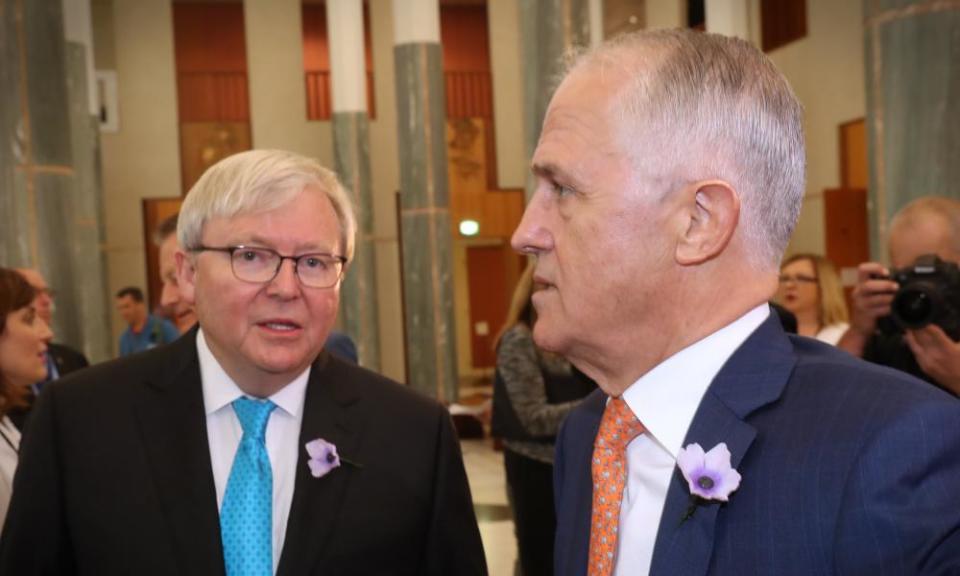Malcolm Turnbull signs Kevin Rudd's petition challenging News Corp media dominance

Former Australian prime minister Malcolm Turnbull has signed Kevin Rudd’s petition calling for a royal commission into News Corp’s dominance of the Australian media.
Rudd, also a former Australian prime minister, launched the petition to the Australian parliament earlier this month, saying the media company employed tactics that “chill free speech and undermine public debate,” and calling for a royal commission to ensure a strong and diverse news media in the face of “new business models that encourage deliberately polarising and politically manipulated news”.
Both Rudd and Turnbull faced negative campaigns from News Corp during their time in office.
On Sunday, Turnbull shared that he had signed the petition.
Related: Kevin Rudd petition calls for royal commission into News Corp domination of Australian media
“Kevin has done well to get this petition going,” he said on Twitter. “I doubt it will result in a Royal Commission and Murdoch’s print monopoly (since 1987) is only part of the problem. But I have signed it and encourage others to do so.”
Kevin has done well to get this petition going. I doubt it will result in a Royal Commission and Murdoch’s print monopoly (since 1987) is only part of the problem. But I have signed it and encourage others to do so. https://t.co/TbY7vW3MSu pic.twitter.com/oyykAMWq5q
— Malcolm Turnbull (@TurnbullMalcolm) October 24, 2020
Rudd said it was “good to have you on board”.
“Supporting media diversity isn’t about left or right, Labor or Liberal, but preserving the lifeblood of our democracy,” he said on Twitter.
In Australia, there is no requirement for the parliament to respond to a petition once it reaches a certain number of signatures. Rudd told Guardian Australia that he knew it was unlikely the current federal government would respond.
“Obviously, the beneficiaries of the Murdoch protection racket, the Liberal National party, will not do that [act],” he said. “It will take some time to convince the Labor party that it’s in their interest as well. That will be influenced directly by the volume of public support.”
The Labor leader, Anthony Albanese, has a distanced himself from the petition, saying Rudd was acting as a private citizen and it was not reflective of Labor policy.
Rudd told the ABC on Tuesday that Turnbull had reached out to him to see how they could work together on curtailing Murdoch’s influence over Australian politics.
Related: 'Culture of fear': why Kevin Rudd is determined to see an end to Murdoch's media dominance
“Malcom reached out to me a couple of days ago,” he said. “He wants to have a discussion about how we handle these matters in the future, so I’ll do that in due course.”
He highlighted that NewsCorp campaigns against him and against Turnbull were a matter of documentary record.
“That is all about the influence and the exercise of Murdoch’s media muscle and knocking over an Australian prime minister,” he said. “Now, I don’t support Mr Turnbull, as you know, for a whole range of policy reasons – although in some areas of policy we have a common view – but this petition of mine is not about partisan politics.
“I’m no longer a player in national politics, I’m not seeking elected office but I am concerned about this cancer on our democracy and if Mr Turnbull wishes to join forces with me on this, well and good.”
Rudd said News Corp’s owner, Rupert Murdoch, was a “virtual monopoly player” in Australia. In his home state of Queensland, which is currently in a state election campaign, every newspaper is owned by NewsCorp.
“This is a one-newspaper state, not just a one-newspaper town,” he said “And anyone who thinks that’s fair in terms of every side of politics having a fair go has got rocks in their head.”
The two former prime ministers have been strange bedfellows in the past 12 years of Australian public life. Turnbull was made opposition leader in 2008, after Rudd won the 2007 election, and then lost the leadership to Tony Abbott in 2009.
In 2012 they appeared together on an episode of ABC’s Q&A, when they were viewed as so similar – moderate, wealthy, and “not very popular in your own parties, but very popular among people” – that one audience member asked if they had considered joining together to form their own political party. Rudd quipped: “Malcolm and I could never agree on the leadership.”

